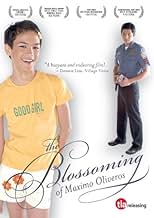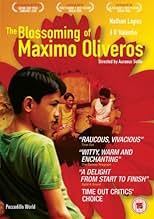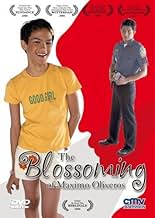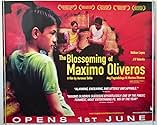CALIFICACIÓN DE IMDb
7.0/10
1.7 k
TU CALIFICACIÓN
Agrega una trama en tu idiomaA young boy falls in love with a handsome policeman who is investigating his family's criminal activities.A young boy falls in love with a handsome policeman who is investigating his family's criminal activities.A young boy falls in love with a handsome policeman who is investigating his family's criminal activities.
- Dirección
- Guionista
- Elenco
- Premios
- 24 premios ganados y 28 nominaciones en total
JR Valentin
- Victor Perez
- (as J.R. Valentin)
Jett Desalesa
- Leslie - Maxi's friend
- (as Sir Jett Desalesa)
- Dirección
- Guionista
- Todo el elenco y el equipo
- Producción, taquilla y más en IMDbPro
Opiniones destacadas
I really didn't know what to expect on sitting down to watch The Blossoming of Maximo Oliveros. Only knowing a few details of the plot - a young Philippino boy, the slums of Manila, a cop - I was worried that this was not likely to be the feelgood film of 2007!
How wrong I was. This film is one of the most unexpected delights of recent years, anchored by a central performance from 12-year-old Nathan Lopez that is dazzlingly mature and breathtakingly charming. Although the film does veer into melodramatic territory in the predictable conflict between JR Valentin's young cop and Maxi's family of petty criminals, the central storyline of Maxi's crush on the hunky policeman is handled with tremendous sensitivity, humour and warmth.
In a perfect world performances like Lopez's would gather awards like daffodils, but in the absence of any trophies I hope he's happy to have created such a memorable character. If your heart doesn't break watching Maxi's story, chances are you have no heart to break.
How wrong I was. This film is one of the most unexpected delights of recent years, anchored by a central performance from 12-year-old Nathan Lopez that is dazzlingly mature and breathtakingly charming. Although the film does veer into melodramatic territory in the predictable conflict between JR Valentin's young cop and Maxi's family of petty criminals, the central storyline of Maxi's crush on the hunky policeman is handled with tremendous sensitivity, humour and warmth.
In a perfect world performances like Lopez's would gather awards like daffodils, but in the absence of any trophies I hope he's happy to have created such a memorable character. If your heart doesn't break watching Maxi's story, chances are you have no heart to break.
Although the main character is gay, this is not a gay film. The beauty of the film is that it does not make fun of the gay character. Maxi is well-loved and accepted by his family and the community.
There is plenty of humor but this light treatment of the story does not at all trivialize the message that the film wants to bring across to the audience. Scriptwriter Michiko Yamamoto who also wrote the award-winning "Magnifico" has improved her skill in storytelling and is not at all melodramatic this time. She has done away with subplots that don't move the main story much, a weakness of many Filipino scriptwriters who want to tell everything, including the entire history of the Philippines, in one movie. Her characters are all balanced no one is all-evil or all-saint. The most touching scenes are those that show the tenderness of Maxi's tough-guy family to him. However, there are technical glitches that need to be fixed, and with digital technology editing may still be possible, e.g. scenes that are too dark or the screen going black for too long, making the oldies in the audience worry that perhaps the "lagarista" has been caught in traffic with the next roll of film. It is not often that Filipinos abroad get to see a rare gem like this film. Thanks to digital film-making and indie cinema and the film festivals in many countries.
There is plenty of humor but this light treatment of the story does not at all trivialize the message that the film wants to bring across to the audience. Scriptwriter Michiko Yamamoto who also wrote the award-winning "Magnifico" has improved her skill in storytelling and is not at all melodramatic this time. She has done away with subplots that don't move the main story much, a weakness of many Filipino scriptwriters who want to tell everything, including the entire history of the Philippines, in one movie. Her characters are all balanced no one is all-evil or all-saint. The most touching scenes are those that show the tenderness of Maxi's tough-guy family to him. However, there are technical glitches that need to be fixed, and with digital technology editing may still be possible, e.g. scenes that are too dark or the screen going black for too long, making the oldies in the audience worry that perhaps the "lagarista" has been caught in traffic with the next roll of film. It is not often that Filipinos abroad get to see a rare gem like this film. Thanks to digital film-making and indie cinema and the film festivals in many countries.
Though its a thoroughly Catholic-dominated country, the Philippines is said to have a more lax attitude towards "the gay" than other more liberal, democratic countries, like the one I live in. Many point to its cinema as evidence of this. Of course, this is from the outside looking in. LGBT folks, particularly the effeminate "bakla" male, might be commonplace in Philippine film, but the ones we don't see on screen face a particular type of oppression. They are often an object of ridicule, stereotyped as shallow, loud-talking and outrageously "mayabang," and usually sex-crazed. And a lot of folks, gay or straight, eat it up.
Despite its deceptive marketing (from the DVD cover/promo poster to the trailer), Auraeus Solito's Ang Pagdadalaga ni Maximo Oliveros/The Blossoming of Maximo Oliveros (2006) isn't at all about a flamboyantly gay boy's crush on the hunky neighborhood police officer that happens to be set in a third world barrio. The story is the barrio, and all its contradictions, initially dressed up as a neorealist comedy evoking both Lino Brocka and Bagets at once before taking a darker turn halfway through.
Like all good (worthwhile) Philippine stories, its aware of acute third world contradictions without overtly speaking on it. If Brillante Mendoza's work emphasizes people's idealism despite wretched conditions, Solito's flips the formula. His Philippines is one where the people are wretched but the settings, still unmistakably impoverished, can also be a magical, wonderfully pastel-colored place.
Maxi (Nathan Lopez) is 12-years old, gay, and plays surrogate mother to his family of petty thieves: tatay Paco (Soliman Cruz) and his older brothers Boy and Bog. The barrio is his playground, until one night he's assaulted by some knuckleheads. Policeman Victor (JR Valentin) comes to his rescue, and they become friends much to his family's objection. Matters complicate when Boy ends up killing somebody in a botched robbery attempt. Lopez brings remarkable ease to the title character, embodying urban poor Philippines with simplicity and struggle. His selfless need/want to care for others is carried by a fragile balance between a naive confidence of who he is and a growing insecurity of where he is (and where he's heading). He dreams in a bubble in the process of bursting, asking his father "Wala na bang ibang paraan itay?" (Is there no other way, dad?)
On the surface, he's nothing like his macho, gun-toting father. However, beneath the princess demeanor, he is his father's son, perhaps more so than his brothers. Conditions have forced Paco to consider what is more dignified: starving with a factory job, or getting by as a petty thief. Maxi has inherited his father's most lasting trait: a commitment to keep the family together. Or at least fed, clothed and sheltered, even if it means doing the "wrong" thing. Thus, Maxi's "blossoming" has less to do with dealing with his rejected affections for Victor and more with facing down the reality of his family's livelihood.
Restrained by necessity rather than stylistic choice, Solito shows us what could be done with a digital camera, $10,000US and 13 days of shooting. It's a style of film that can never be overdone in the Philippines, where lack of support from the media industry and government and resources forces an organic creativity.
Solito's execution is matched by writer Michiko Yamamoto's (Magnifico, 2003) gift for compact, delightful drama/comedy without teetering to far in either direction. Thanks to this collaboration, Ang Pagdadalaga ni Maximo Oliveros is a leap forward from the gay caricatures we've gotten too used to, and yet another piece of a compelling argument that Philippine cinema isn't all cornball and melodrama. Or, that a movie can still have those elements and not be shitty.
Despite its deceptive marketing (from the DVD cover/promo poster to the trailer), Auraeus Solito's Ang Pagdadalaga ni Maximo Oliveros/The Blossoming of Maximo Oliveros (2006) isn't at all about a flamboyantly gay boy's crush on the hunky neighborhood police officer that happens to be set in a third world barrio. The story is the barrio, and all its contradictions, initially dressed up as a neorealist comedy evoking both Lino Brocka and Bagets at once before taking a darker turn halfway through.
Like all good (worthwhile) Philippine stories, its aware of acute third world contradictions without overtly speaking on it. If Brillante Mendoza's work emphasizes people's idealism despite wretched conditions, Solito's flips the formula. His Philippines is one where the people are wretched but the settings, still unmistakably impoverished, can also be a magical, wonderfully pastel-colored place.
Maxi (Nathan Lopez) is 12-years old, gay, and plays surrogate mother to his family of petty thieves: tatay Paco (Soliman Cruz) and his older brothers Boy and Bog. The barrio is his playground, until one night he's assaulted by some knuckleheads. Policeman Victor (JR Valentin) comes to his rescue, and they become friends much to his family's objection. Matters complicate when Boy ends up killing somebody in a botched robbery attempt. Lopez brings remarkable ease to the title character, embodying urban poor Philippines with simplicity and struggle. His selfless need/want to care for others is carried by a fragile balance between a naive confidence of who he is and a growing insecurity of where he is (and where he's heading). He dreams in a bubble in the process of bursting, asking his father "Wala na bang ibang paraan itay?" (Is there no other way, dad?)
On the surface, he's nothing like his macho, gun-toting father. However, beneath the princess demeanor, he is his father's son, perhaps more so than his brothers. Conditions have forced Paco to consider what is more dignified: starving with a factory job, or getting by as a petty thief. Maxi has inherited his father's most lasting trait: a commitment to keep the family together. Or at least fed, clothed and sheltered, even if it means doing the "wrong" thing. Thus, Maxi's "blossoming" has less to do with dealing with his rejected affections for Victor and more with facing down the reality of his family's livelihood.
Restrained by necessity rather than stylistic choice, Solito shows us what could be done with a digital camera, $10,000US and 13 days of shooting. It's a style of film that can never be overdone in the Philippines, where lack of support from the media industry and government and resources forces an organic creativity.
Solito's execution is matched by writer Michiko Yamamoto's (Magnifico, 2003) gift for compact, delightful drama/comedy without teetering to far in either direction. Thanks to this collaboration, Ang Pagdadalaga ni Maximo Oliveros is a leap forward from the gay caricatures we've gotten too used to, and yet another piece of a compelling argument that Philippine cinema isn't all cornball and melodrama. Or, that a movie can still have those elements and not be shitty.
Absolutely delightful film, its story centering around Maxi (Nathan Lopez), a beguiling 12 year old boy who wants to be a girl, and his various flirtations, including an unlikely one with a rookie cop on the neighborhood beat. Maxi's Dad and two older brothers are criminal lowlifes capable of very bad deeds, including murder, but they are entirely devoted to Maxi, who cooks and keeps house for them (Mom died a few years before). The feeling is mutual: as Maxi says, there may be a lot of crooked people around, but he's only got one Dad.
The film is chock full of arresting street scenes in metropolitan Manila, and intriguing tensions among the principals. It is most refreshing to see loving, tender feelings binding a marginal family together, rather than the usual melodramatic dysphoria that infects, but does not inform, many movies about the underclass. (This year's "Quinceañera" is another film that plays up the positive aspects of family life in L.A.'s Echo Park Mexican-American barrio.) An exotic, spellbinding, bounteous bouquet of a film. Won several awards at the Berlin and Cinemalaya Film Festivals, among others, and was nominated for the Grand Jury Award this year at Sundance. (In Filipino, Tagalog & English) My grades: 8.5/10, A- (Seen on 11/21/06)
The film is chock full of arresting street scenes in metropolitan Manila, and intriguing tensions among the principals. It is most refreshing to see loving, tender feelings binding a marginal family together, rather than the usual melodramatic dysphoria that infects, but does not inform, many movies about the underclass. (This year's "Quinceañera" is another film that plays up the positive aspects of family life in L.A.'s Echo Park Mexican-American barrio.) An exotic, spellbinding, bounteous bouquet of a film. Won several awards at the Berlin and Cinemalaya Film Festivals, among others, and was nominated for the Grand Jury Award this year at Sundance. (In Filipino, Tagalog & English) My grades: 8.5/10, A- (Seen on 11/21/06)
10fjgebaue
I saw this at the San Francisco Film Festival... it is really a beautifully done film that has both good laughs and good drama. It is amazing that this film was produced for about $10,000 US and was shot in 13 days in the director's own hometown neighborhood. This film will surprise you with its frankness and honesty, and I can't recommend it highly enough. I've seen plenty of boring and trite or irrelevant films at film festivals. This film is certainly worthy of your time and may change the way you look at poverty, at gay people, and at the nature of families and the love of parent and child, sibling and sibling. It is also a wonderful "barrio" film in the tradition of "Macho Dancer," but I think it does that film one better. I would definitely see this movie once or twice again. It is easily as good as any Hollywood film.
¿Sabías que…?
- TriviaJoey Pepe Smith who plays the piano man being teased by the kids is the one who scored the film.
- ConexionesReferenced in Ako ang simula: The ABS-CBN News and Current Affairs Yearend Special (2006)
- Bandas sonorasMy Country, My Philippines
Written and Performed by Yoyoy Villame
Selecciones populares
Inicia sesión para calificar y agrega a la lista de videos para obtener recomendaciones personalizadas
- How long is The Blossoming of Maximo Oliveros?Con tecnología de Alexa
Detalles
- Fecha de lanzamiento
- País de origen
- Sitios oficiales
- Idiomas
- También se conoce como
- The Blossoming of Maximo Oliveros
- Locaciones de filmación
- Productoras
- Ver más créditos de la compañía en IMDbPro
Taquilla
- Total en EE. UU. y Canadá
- USD 28,041
- Fin de semana de estreno en EE. UU. y Canadá
- USD 6,690
- 24 sep 2006
- Total a nivel mundial
- USD 38,691
- Tiempo de ejecución1 hora 40 minutos
- Color
Contribuir a esta página
Sugiere una edición o agrega el contenido que falta

Principales brechas de datos
By what name was Ang pagdadalaga ni Maximo Oliveros (2005) officially released in Canada in English?
Responda
























